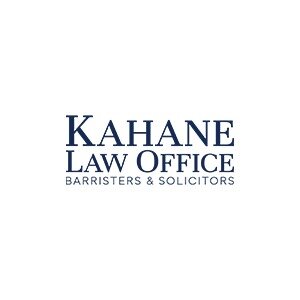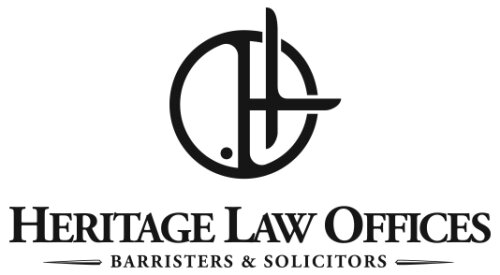Best Public-Private Partnerships (PPP) Lawyers in Edmonton
Share your needs with us, get contacted by law firms.
Free. Takes 2 min.
List of the best lawyers in Edmonton, Canada
About Public-Private Partnerships (PPP) Law in Edmonton, Canada
Public-Private Partnerships, commonly known as PPPs, are collaborative agreements between government agencies and private sector companies to finance, build, and operate projects that serve the public. In Edmonton, Canada, PPPs are used to deliver a wide range of infrastructure projects, such as schools, hospitals, transportation systems, and municipal facilities. The goal is to combine the strengths of both public resources and private expertise to deliver cost-effective and innovative public services. PPPs in Edmonton are guided by federal, provincial, and municipal frameworks, with the City of Edmonton and the Province of Alberta playing significant roles in regulating and managing these partnerships.
Why You May Need a Lawyer
Engaging in a Public-Private Partnership involves complex negotiations, contractual obligations, and regulatory compliance, making legal guidance essential. Here are some common situations where you may need a lawyer for PPPs in Edmonton:
- Drafting or reviewing PPP agreements and contracts
- Ensuring compliance with local, provincial, and federal regulations
- Assessing risk allocation and dispute resolution terms
- Negotiating roles and responsibilities among stakeholders
- Assisting in procurement processes and tendering procedures
- Addressing issues related to financing, construction, and operation phases
- Managing property rights, intellectual property, or service delivery concerns
- Representing clients in case of disputes or litigation related to PPP projects
Legal assistance can help safeguard your interests, ensure projects adhere to all relevant laws, and minimize potential risks associated with large-scale partnerships.
Local Laws Overview
PPP projects in Edmonton are governed by a combination of federal, provincial, and municipal laws. The legal landscape includes:
- Government of Alberta’s PPP Framework: Alberta Infrastructure and Alberta Transportation provide guidelines for PPP projects, focusing on value-for-money assessments, risk transfers, and competitive procurement.
- City of Edmonton Bylaws and Policies: The City of Edmonton often develops its own policies based on the province’s framework, outlining roles, responsibilities, finance mechanisms, and public accountability.
- Federal Regulations: For projects involving federal funding, PPPs must comply with federal statutes and the mandates of organizations such as Infrastructure Canada.
- Procurement Laws: The Alberta Public Agencies Governance Act and other procurement regulations govern bidding, transparency, and fairness in awarding contracts.
- Environmental and Building Standards: Projects must comply with environmental approvals and municipal building codes.
- Dispute Resolution Mechanisms: PPP contracts typically require parties to adhere to specified arbitration or litigation pathways as part of project governance.
Understanding the interplay of these laws is crucial for parties involved in PPPs within Edmonton.
Frequently Asked Questions
What is a Public-Private Partnership (PPP)?
A PPP is a collaborative arrangement where the public sector partners with the private sector to fund, construct, and operate infrastructure or public services for an agreed period.
How are PPPs different from traditional infrastructure projects?
Unlike traditional models where the public sector funds and manages projects, PPPs involve shared risks, responsibilities, and financing with private entities, often leading to innovative solutions and cost efficiencies.
Who oversees PPPs in Edmonton?
Edmonton PPPs may be overseen by the City of Edmonton, the Province of Alberta (through Alberta Infrastructure and Alberta Transportation), and, in some cases, federal agencies depending on the scope and funding of the project.
What types of projects use PPPs in Edmonton?
PPPs are commonly used for large-scale infrastructure such as roads, bridges, schools, healthcare facilities, and public transportation networks.
What are the key risks in PPP projects?
Major risks include construction delays, cost overruns, regulatory compliance, financing challenges, changes in public demand, and disputes over contractual obligations.
How are risks managed in PPP agreements?
Risk allocation is a central aspect of PPP agreements, with responsibilities assigned to the party best equipped to manage each specific risk, often formalized contractually.
Can small businesses participate in PPPs?
While PPPs are usually pursued by larger firms, subcontracting opportunities often exist for small and medium enterprises (SMEs) in design, construction, supply, or service areas.
How does procurement work for PPP projects in Edmonton?
Procurement generally involves competitive bidding and expression-of-interest processes, governed by provincial and municipal laws to ensure fairness and value for money.
What legal documents are involved in PPPs?
Key documents include project agreements, concession agreements, design-build contracts, maintenance and operation contracts, and financing agreements.
What should I do if there is a dispute in a PPP project?
PPP agreements typically outline dispute resolution procedures such as negotiation, mediation, arbitration, or litigation. Consulting a lawyer early can help you understand your rights and obligations.
Additional Resources
- Alberta Infrastructure: Provides guidelines, policies, and templates for PPP projects in Alberta.
- City of Edmonton: Offers information about local PPP initiatives and tender opportunities.
- Infrastructure Canada: Supports large national PPP projects and offers related policy documents.
- Canadian Council for Public-Private Partnerships: Promotes best practices and offers educational resources.
- Alberta Public Agencies Governance Secretariat: Oversees procurement standards for public agencies and partnerships.
- Law Society of Alberta: Directory of qualified lawyers with expertise in PPP and infrastructure law.
Next Steps
If you are considering entering into, or already involved in, a Public-Private Partnership in Edmonton, it is essential to take the following steps:
- Gather all documentation related to your potential or current PPP project, including agreements, correspondence, and tender documents.
- Research the basic framework and requirements of PPPs relevant to your situation using local and provincial resources.
- Identify your main objectives, concerns, and any potential issues you foresee with the partnership.
- Consult with a lawyer who specializes in PPP and infrastructure law for guidance on regulatory compliance, risk management, and contractual terms.
- Work with your legal counsel to review all agreements before signing, ensuring all risks and responsibilities are clearly allocated and documented.
- Should any disputes or complications arise during the project, seek legal advice early to protect your interests and explore potential resolutions.
Professional legal advice is crucial when navigating the complexities of Public-Private Partnerships in Edmonton, ensuring your project’s success and minimizing risk.
Lawzana helps you find the best lawyers and law firms in Edmonton through a curated and pre-screened list of qualified legal professionals. Our platform offers rankings and detailed profiles of attorneys and law firms, allowing you to compare based on practice areas, including Public-Private Partnerships (PPP), experience, and client feedback.
Each profile includes a description of the firm's areas of practice, client reviews, team members and partners, year of establishment, spoken languages, office locations, contact information, social media presence, and any published articles or resources. Most firms on our platform speak English and are experienced in both local and international legal matters.
Get a quote from top-rated law firms in Edmonton, Canada — quickly, securely, and without unnecessary hassle.
Disclaimer:
The information provided on this page is for general informational purposes only and does not constitute legal advice. While we strive to ensure the accuracy and relevance of the content, legal information may change over time, and interpretations of the law can vary. You should always consult with a qualified legal professional for advice specific to your situation.
We disclaim all liability for actions taken or not taken based on the content of this page. If you believe any information is incorrect or outdated, please contact us, and we will review and update it where appropriate.











